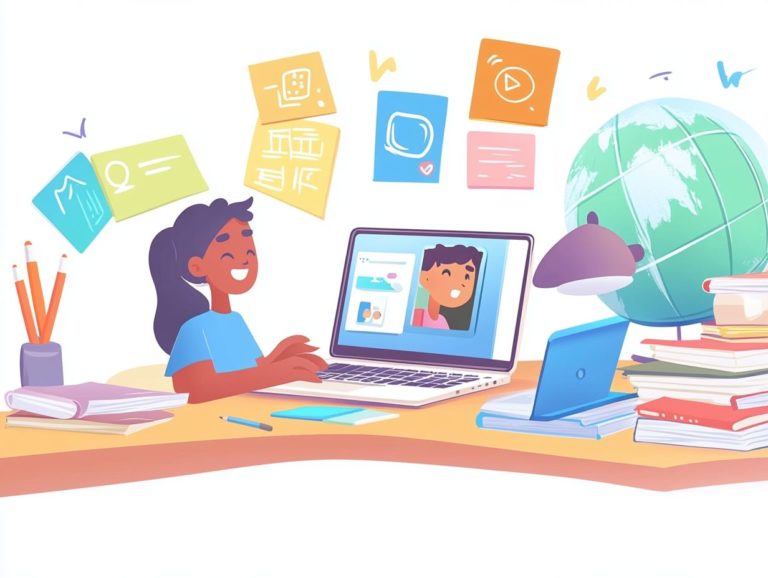5 Tips for Learning a Language While Traveling
Traveling provides an amazing opportunity to immerse yourself in a new language and culture.
As you wander through vibrant markets or share meals with locals, each experience enhances your language skills.
This guide outlines five effective tips designed to help you learn a language while on the move. From embracing cultural immersion to leveraging language apps, you’ll discover practical strategies that can make your journey both enriching and educational.
Ready to turn your travels into an exciting language-learning journey? Let’s dive in!
Don’t miss out on these tips!
Contents
- Key Takeaways:
- 1. Immerse Yourself in the Culture
- 2. Practice with Locals
- 3. Use Language Learning Apps
- 4. Take Language Classes
- 5. Keep a Language Learning Journal
- What Are the Benefits of Learning a Language While Traveling?
- Frequently Asked Questions
- What are 5 tips for learning a language while traveling?
- How can immersing myself in the local culture help me learn a language while traveling?
- Are language learning apps effective for learning a language while traveling?
- What are the benefits of joining a language exchange program while traveling?
- Is consistency important when learning a language while traveling?
- Should I be afraid of making mistakes while learning a language while traveling?
Key Takeaways:

- Immerse yourself in the culture to fully understand the language.
- Practice with locals to gain practical and cultural knowledge.
- Utilize language learning apps to enhance your learning experience.
1. Immerse Yourself in the Culture
Immersing yourself in the local culture is an amazing experience that truly elevates your language learning journey, especially in places like Spain, Italy, or Romania, where native speakers are plentiful. To enhance this experience, consider following some tips for connecting with locals while traveling.
Engaging with the rich history, traditions, and daily life of a region allows you to practice speaking in real-life situations, refining your communication skills while deepening your understanding of local customs and idioms.
By participating in local activities, from savoring a coffee at a quaint caf to reveling in vibrant festivals, you ll uncover countless opportunities for daily practice that enrich your vocabulary and enhance your grammar.
Such experiences bolster your confidence and create lasting memories through interactions that may initially seem a bit intimidating. Imagine navigating a bustling market to order delicious street food it’s a fantastic way to learn food-related vocabulary while indulging in local delicacies.
Sharing stories with local residents, whether over a warm cup of coffee or during a lively community gathering, fosters invaluable social skills and deepens your appreciation of cultural nuances.
To maximize your engagement, consider picking up a few key phrases ahead of time. This little preparation can open doors and encourage locals to share their insights, transforming an ordinary trip into a profound cultural exchange. Additionally, while traveling, you might want to explore tips for sustainable eating to enhance your experience.
2. Practice with Locals
Practicing with locals is an invaluable part of your language learning journey. It gives you the chance to engage directly with native speakers, break down communication barriers, and build your confidence in speaking.
By seeking out language buddies or joining language exchange programs, you can immerse yourself in real-life conversations that enhance your fluency.
Connecting with others through online platforms or local meet-ups can lead to meaningful exchanges, whether you find yourself in cozy caf s, bustling restaurants, or vibrant markets.
These social settings create an authentic environment for you to practice speaking, allowing for spontaneous dialogues that mirror everyday life. If shyness holds you back, start with small interactions, like asking for directions or ordering food these can be surprisingly effective.
As your comfort level increases, more in-depth conversations will naturally unfold, maximizing your opportunity for practice.
3. Use Language Learning Apps
Language learning apps like Duolingo offer you an accessible and interactive platform to enhance your vocabulary and pronunciation while you’re on the move, making them critical tools for anyone eager to master a new language.
These applications not only provide tailored lessons that adapt to your unique learning style but also include practice sessions designed to reinforce your language retention.
For example, platforms like Babbel emphasize conversational skills, allowing you to engage in realistic dialogues that reflect everyday situations. On the other hand, Rosetta Stone immerses you in a fully interactive environment, honing your visual and auditory connections.
Many of these apps meticulously track your progress, enabling you to set specific goals and monitor your development over time. With such personalized features, you can easily find a program that aligns with your individual journey, transforming learning a language, or language acquisition, into an enjoyable and sustainable experience.
Start practicing today!
4. Take Language Classes

Enrolling in language courses can significantly speed up your language learning journey. Structured study methods, a focus on key grammar rules, and countless opportunities for speaking practice set you up for success.
There are various options available to cater to your unique learning style and preferences. For instance, immersive travel programs that allow you to live in a country while learning its language plunge you directly into the culture. If you’re considering exploring on your own, check out these tips for traveling solo as a student. This approach dramatically enhances your retention and fluency.
On the other hand, online courses provide the flexibility of tailored content and schedules, letting you progress at your own pace. Whichever path you choose, remember that setting realistic goals is essential. It helps you avoid overwhelm and keeps your motivation high.
Structured lessons ensure that you systematically cover essential material. This facilitates steady progress and builds your confidence as you navigate the complexities of your new language.
5. Keep a Language Learning Journal
Maintaining a language learning journal is an invaluable asset for enhancing retention and tracking your progress. It allows you to reflect on your daily practice, new vocabulary, and grammar rules.
Reflecting on your daily practice reinforces what you’ve learned. It also sparks creativity in using the language. Regular journaling provides a structured approach to practicing vocabulary encouraging you to weave recently learned words into meaningful sentences, thereby solidifying your understanding.
By including personal anecdotes or daily experiences, you create context that makes it easier to remember and apply vocabulary. To truly maximize your efforts, aim to write consistently, explore various topics, and review past entries. Start your language learning journal today! This simple step can dramatically enhance your learning journey.
What Are the Benefits of Learning a Language While Traveling?
Learning a language while traveling brings a wealth of benefits that can elevate your journeys. You’ll find that it enhances your communication skills, deepens your cultural understanding, and allows you to engage meaningfully with locals. For those with tight schedules, following 5 tips for learning a language with a busy schedule can make the process easier. This not only enriches your travel experiences but also broadens your language opportunities.
Imagine walking through a bustling market, chatting with locals, and discovering hidden gems all while practicing your language skills! Immersive experiences like these provide the perfect backdrop for practicing your skills in real-life situations. For tips on overcoming challenges, check out how to navigate language barriers while abroad, making language acquisition both effective and enjoyable.
Connecting with native speakers helps you forge authentic relationships and unlock unique insights into their culture, fostering a genuine appreciation for diversity.
Many language enthusiasts recount how navigating a bustling market or savoring a local meal while conversing in the native tongue transformed their travels. One traveler shared how speaking Spanish led to unexpected friendships in Spain, while another noted that engaging with locals in Japan significantly sharpened her conversational Japanese. For those interested in enhancing their skills, exploring resources like tips for daily practice can be invaluable.
These personal anecdotes serve as powerful reminders that travel boosts your language proficiency and enriches your personal growth, connecting you across cultures.
How Can Cultural Immersion Help with Language Learning?
Cultural immersion acts as a powerful force for your language learning journey, creating an environment where you can truly connect with locals and grasp the nuances of their culture through immersive travel experiences.
This hands-on approach doesn t just speed up the learning process; it also enriches your vocabulary with contextual significance. When you dive into local events, like festivals or community gatherings, you become attuned to colloquial expressions that textbooks often miss.
Additionally, enrolling in cooking classes provides a delightful way to absorb culinary terminology while engaging with others in an interactive setting. By asking questions about traditional recipes or ingredients, you acquire practical language skills and deepen your understanding of cultural significance.
This creates a vibrant and effective language-learning journey that transcends mere vocabulary.
What Are the Best Ways to Practice with Locals?

Practicing with locals is essential for you as a language learner, offering countless opportunities to refine your speaking skills, enhance your communication abilities, and build confidence through engaging social interactions.
By immersing yourself in the local culture, you can attend a variety of meetups tailored specifically for language practice. These can range from casual coffee chats to more structured events. Engaging in language exchange programs fosters meaningful connections and promotes learning from each other, ensuring that both you and your partner benefit from the shared experience.
Volunteering in community projects provides a fantastic avenue for real-world practice. This approach deepens your understanding of the language while positively impacting the community. Stay consistent in these efforts. Frequent interactions cultivate a supportive environment that accelerates your language acquisition and nurtures lasting friendships.
Which Language Learning Apps Are Most Effective?
The effectiveness of language learning apps can significantly enhance your learning journey. They allow you to focus on vocabulary, refine your pronunciation, and engage in interactive experiences tailored to your personal goals.
Applications like Duolingo, Babbel, and Rosetta Stone come with unique features that cater to various learning styles. This makes it seamless for you to weave language practice into your daily routine.
Whether you prefer gamified lessons, real-life dialogues, or using technology that helps you improve your speaking skills by recognizing your voice, these tools are exceptional supplements to traditional classroom environments.
By offering instant feedback and a wealth of practice opportunities, you are given the power to revisit challenging concepts at your own pace. This effectively bridges the gap between theoretical knowledge and practical application in real-world scenarios.
What Are the Different Types of Language Classes Available?
Discover a wide variety of exciting language classes available, from immersive experiences to online courses. Each is tailored to meet various study methods and language aspirations.
These classes can profoundly influence your learning journey by presenting unique advantages and challenges. Immersive programs often accelerate fluency and enhance cultural understanding by surrounding you with native speakers. However, they may sacrifice schedule flexibility.
On the other hand, online courses offer the convenience of self-paced learning, but they can occasionally fall short in fostering robust conversational skills. In terms of grammar instruction, immersive settings focus on practical usage through real-life context, while online platforms tend to provide structured lessons that rigorously cover the rules.
Ultimately, the effectiveness of these approaches hinges on your individual learning style and goals. This highlights the critical importance of selecting the right course to achieve your desired outcomes.
How Can Keeping a Language Learning Journal Help with Retention?
Keeping a language learning journal can greatly enhance your retention by offering a dedicated space to practice vocabulary, reflect on your progress, and incorporate effective language tips.
This process not only helps you organize your thoughts but also strengthens cognitive connections related to the new language. By jotting down your daily experiences, you can cultivate a deeper understanding of grammatical structures and idiomatic expressions.
Encouraging entries like daily reflections, vocabulary lists, or even personal anecdotes can turn journaling into an engaging routine. As you commit to this habit, the synergy between practice and reflection will foster a deeper sense of achievement and motivation, transforming your language learning journey into a continuous and rewarding experience.
Frequently Asked Questions

What are 5 tips for learning a language while traveling?
1. Immerse yourself in the local culture: Get involved in local life by trying new foods and attending events. To enhance your experience, check out tips on navigating language barriers and talk to the locals for a real taste of the language.
2. Practice every day: Consistency is key! Set aside time each day to speak, listen, and read in the language.
3. Use language learning apps: Many apps make learning convenient. They offer interactive lessons and let you connect with native speakers, highlighting the advantages of learning a language before traveling.
4. Join a language exchange: Find language exchange programs to practice speaking and immerse yourself in the culture. This is a fun way to learn, and you can also explore how to overcome language barriers while traveling.
5. Don t be afraid to make mistakes: Mistakes are part of learning. Keep practicing, and you ll get better!
How can immersing myself in the local culture help me learn a language while traveling?
Getting involved in local life speeds up language learning. You’ll constantly hear the language and will have chances to practice with native speakers.
Are language learning apps effective for learning a language while traveling?
Yes! Language learning apps are great tools. They offer interactive lessons and let you practice anytime, anywhere.
What are the benefits of joining a language exchange program while traveling?
Joining a language exchange lets you speak with native speakers and learn about their culture. It s a safe place to make mistakes and improve.
Is consistency important when learning a language while traveling?
Absolutely! Daily practice helps strengthen your skills. It s better to practice a little each day than to cram less often.
Should I be afraid of making mistakes while learning a language while traveling?
No! Mistakes are part of the journey. Learn from them and keep practicing to improve your skills.






